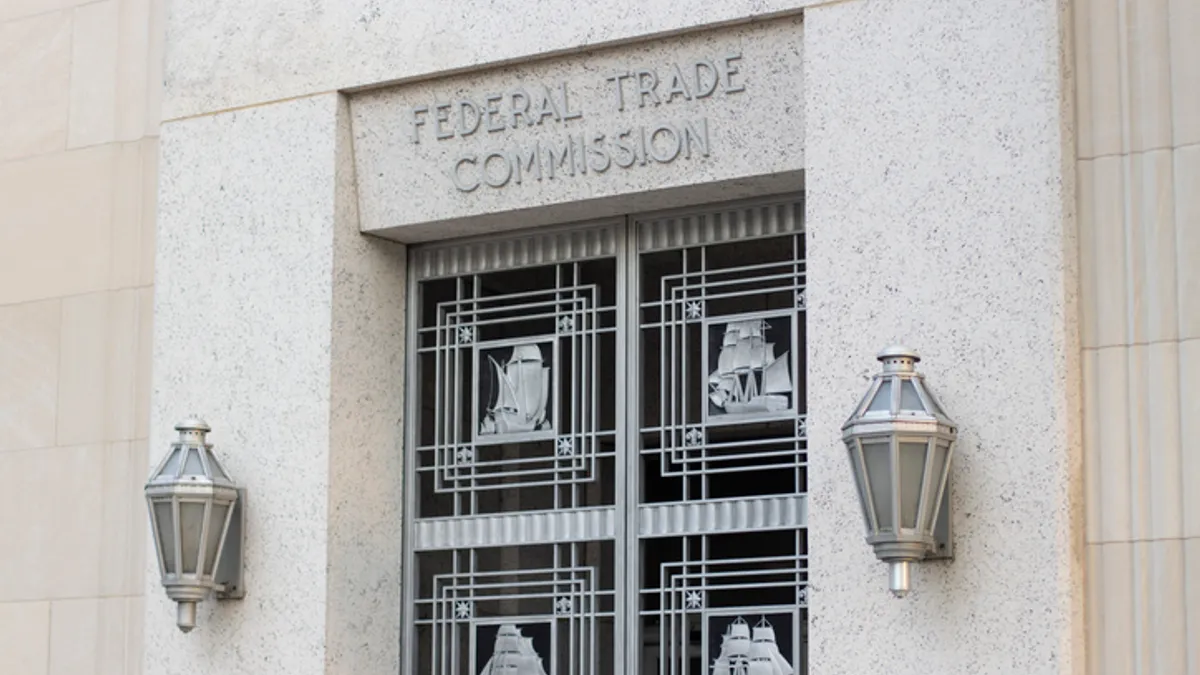Dive Brief:
- The Federal Trade Commission generated $5 in consumer benefit for each dollar it spent on enforcement, a big drop from previous years, according to the agency’s fiscal 2024 financial report, released Nov. 15.
- As recently as fiscal 2021, the agency was seeing almost $13 in consumer benefit for each enforcement dollar — a recent high-water mark that the agency isn’t likely to reach again any time soon. The reason, the FTC says, is a 2020 U.S. Supreme Court decision, in AMG v. FTC, that said federal courts had been wrong to allow the agency to make a claim for money from companies in addition to obtaining a permanent injunction.
- “It has become increasingly difficult for the FTC to receive monetary relief for consumers in federal court,” the FTC said in the report.
Dive Insight:
The drop in return on its enforcement efforts was foreshadowed in its fiscal 2023 financial report, which said the agency only brought in $65 million in money from companies, a big drop from fiscal 2020, the last year before the AMG decision, when it brought in almost $5.7 billion, a drop of more than $5.5 billion.
“AMG stripped federal courts of the authority — which they had been exercising for more than 4 decades — to award equitable monetary relief,” the agency said in last year’s report.
“Equitable monetary relief” is the courts’ term for disgorgement of gains a company obtains through practices that are later found to be unlawful. In the FTC’s case, it had been regularly pursuing this kind of relief under Section 13(b) of the FTC Act, but in AMG, the court said there was nothing in the law that entitled the FTC to do that.
“Court-ordered monetary relief … is foreclosed by the structure and history of the Act,” the court said.
In the five years prior to the Supreme Court decision, the FTC had brought in more than $11 billion, money that it either returned to consumers who were harmed by the practice or handed over to Treasury if it couldn’t reasonably identify who was entitled to relief.
The agency still has a way to pursue relief, it says, but it’s limited to violations of law that the FTC is explicitly authorized to enforce, like the Restore Online Shoppers Confidence Act, and to rules it’s enacted under its existing authority, like the Made in America rule, which requires products labeled “Made in America” to meet certain standards.
The FTC suggests it can apply this authority, which comes under Section 19 of the FTC Act, in much the same way it applied Section 13(b) — that is, by seeking monetary relief as part of a court ordered permanent injunction – as long as it goes after violators under these existing laws and rules.
“Since the decision, the FTC’s primary means for obtaining monetary relief is through FTC Act Section 19,” the agency says in its fiscal 2023 report.
Not everyone agrees the FTC can seek monetary relief as part of a court order under Section 19 unless it first issues an administrative cease-and-desist order. Then, if the company violates the order, the agency can take the case to court.
“The FTC has been relying on this theory to obtain money penalties in settlements for first-time violations of the FTC Act without first obtaining the administrative order,” Christopher Leach and Kevin Healy of Mayer Brown say in an analysis. But, they add, “AMG would seem to preclude that outcome” in the same way it did for Section 13(b).
The FTC acknowledges it must take an administrative action first if it goes after violations that don’t fall under one of the laws, or any of its rules. And it’s this two-step process that’s affecting the efficiency of its enforcement operations.
“For cases post-AMG that involve deceptive or unfair conduct that does not violate an existing FTC rule, the process is time-consuming and resource-intensive,” the agency says in its 2023 report. “It requires agency staff to litigate the case twice – once through the administrative process, and then in federal court.”
The agency says it’s been working with Congress on legislation that would enable it to use Section 13(b) the way it used to.
It’s also been enacting rules to make it easier to use the Section 19 process. For example, in August, it enacted a final rule prohibiting companies from manipulating reviews and testimonials to make it seem like a product or service is more popular than it is. By enacting explicit rulemaking on this, the agency said when it released the final rule, it’s making it easier to obtain monetary relief.
“Case-by-case enforcement without civil penalty authority might not be enough to deter clearly deceptive review and testimonial practices,” the agency said in announcing the final rule. “This rule will enhance deterrence and strengthen FTC enforcement actions.”
Put another way, by adding this rule to the agency’s authority, it can pursue monetary relief under Section 19, which, as the agency has been interpreting it, is possible to do directly in the courts.
“Finalizing key rules [can] maximize its ability to bring successful cases and obtain monetary relief for consumers, despite recent Supreme Court decisions,” it says in its 2024 report.











